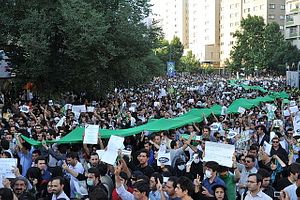It was around this time 37 years ago when a popular uprising overthrew the Shah of Iran and established democracy in the midst of the ancient culture of my home country. It was an accomplishment that was and remains very rare in the Middle East.
I had grown up learning about both Iranian and Western culture, and this shaped my entire professional career. As a child in the early 1950s I began learning the violin. After studying music and singing for Tehran Music Academy, I performed as a soloist for Iran’s State Opera in numerous events. I had the main role in various operas and performed alongside many singers who were renowned across the globe.
I and my late husband, Bahram Alivandi, one of the most celebrated and unique contemporary Iranian painters, were very active in the national uprising. Other women and other artists also played a prominent role, all of them recognizing the urgent need for the freedoms that had been denied to large swaths of Iranian society. That uprising could have inaugurated a new era, one defined by expanded opportunities in all fields of creative expression.
However, as fundamentalist clerics came to power and theocracy took shape in Iran, this new spring quickly turned into a cold winter, with a dark cloud hanging over our country.
Artists and intellectuals are always the first victims of dictatorships, since they consider spreading the truth to be part of their obligatory role and can only showcase their works in an atmosphere of freedom. Terrified by their potential for counteracting the new climate of clerical-backed repression, the new theocracy declared war on all artists, as well as all those who dared to raise their voices.
The Tehran Opera was among the first art institutions to become a victim of religious fascism, and was closed. In the clerical regime, the suppression of women’s voices includes a literal ban on female solo singers, which was imposed in the early days of the Islamic regime and remains in effect to this day.
Those artists who refused to succumb to fundamentalists’ restrictions faced all types of crackdowns, deprivations, and purges. Many were thrown into such poverty that they were only able to make a living as street vendors. Others were thrown behind bars. Various writers and poets who refused to back down from their beliefs were murdered.
A large number of Iran’s best artists were forced to flee and go into exile. By 1983 many of my husband’s students who were activists and supporters of the People’s Mojahedin Organisation of Iran (PMOI/MEK, the main opposition and driving force of the opposition coalition National Council of Resistance of Iran, NCRI), were executed. My husband and I were also supporters of this movement, and these executions finally forced us to flee Iran with our two children and settle in Europe.
During our years in exile I have performed at various artistic events in Germany, Austria, and France and have performed different songs by European and Iranian songwriters. Meanwhile, I have never forgotten the injustices that took place and have continued to take place in my homeland, including the censorship imposed on artists, writers, and other intellectuals.
Neither have I forgotten the lengths that those artists and many other citizens have gone to for the sake of defying that censorship, either in their own work or in their consumption of progressive and pro-democratic media through underground networks, proxy internet servers, and so on. People of every stripe have risked much in an effort to keep the cultural life of a free Iran alive. Some, like members of the PMOI, have risked their very lives to re-create an Iran in which that culture can come out of hiding and be enjoyed by a free population once again.
The world heard cries for freedom rising among the people of Iran in 2009, particularly among women and the youth. Unfortunately, Western governments did little to support that movement to bring about meaningful change in Iran. Instead, they have chosen to pursue a political deal with one of the worst human rights violators in the world.
Since his “election” as the president of the clerical regime in 2013, some in the West have tried to depict Hassan Rouhani as an advocate for reform and a genuine opening of Iranian society. This narrative has only expanded in the wake of last year’s nuclear deal. But far from reforming Iran, Rouhani has presided over an increase in repression against dissidents and political prisoners (including PMOI activists), poets, filmmakers, musicians, and proponents of women rights. During Rouhani’s presidency, some 2200 people have been executed in Iran, a nearly three-fold increase over the same period under his predecessor, Mahmoud Ahmadinejad.
A report published in 2015 by Ahmed Shaheed, the United Nations Special Rapporteur on Human Rights in Iran, reiterated that the human rights situation in Iran had “altogether deteriorated.”
While some in the West have pinned their hopes on the February 26 Iranian “elections” as a potential springboard for “moderates” in Iran’s power structure, the experience of the past three decades indicates that this is simply an illusion. What will take place in Iran on February 26 is not a free democratic election; it is a sham process of selection from among individuals who have proven their total loyalty to this misogynist regime that is an enemy to all aspects of Iranian culture.
Change in Iran is necessary and the coming of a “Persian Spring” is inevitable. As an opera singer, writer, and activist myself, I encourage governments and opinion makers to stand alongside Iranian dissidents and activists in calling for democratic change. The mullahs’ farcical elections are nothing but a political game designed to preserve the existence of a bloodthirsty theocracy. Nothing more.
Nahid Hematabad, a renowned Iranian opera singer, is leaving in exile in Europe. She is a member of the National Council of Resistance of Iran.

































